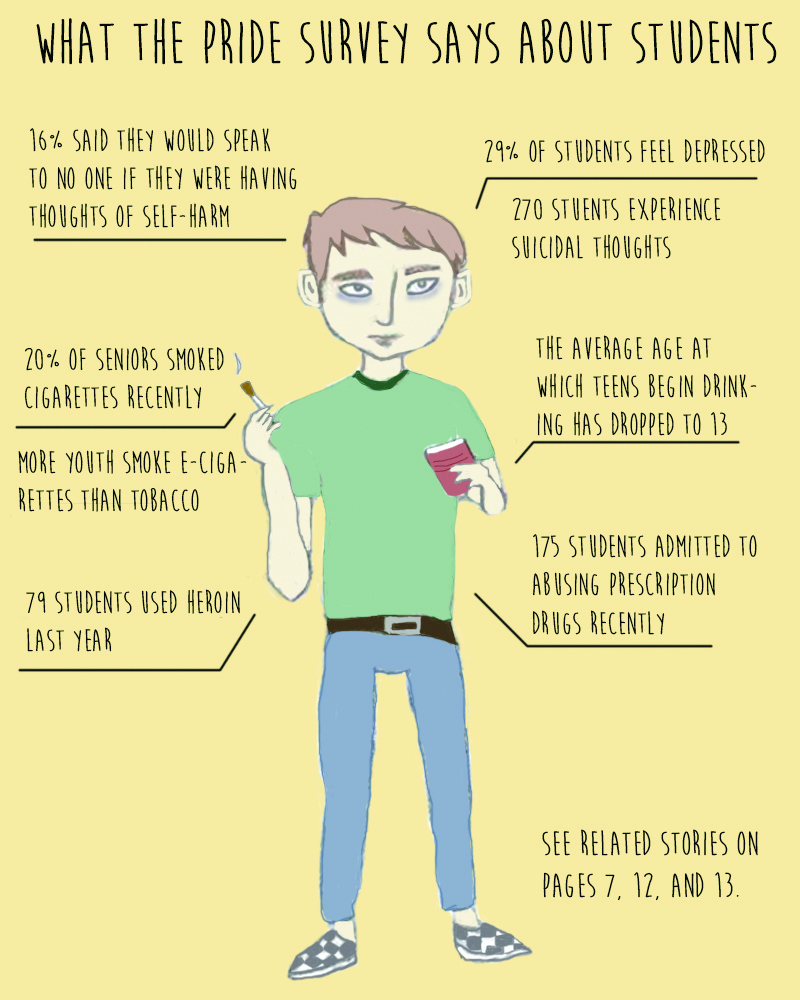Pride survey provides stats on mental health, drug use
April 16, 2016
 Last fall, 4450 Fauquier County students in the seventh through 12th grades took the Pride Student Survey. Last administered in 2009 and sponsored by Fauquier County Public Schools (FCPS), Fauquier CADRE, and the Mental Health Association of Fauquier, the survey provides the School Board with statistics regarding student drug use, mental health, and safety issues.
Last fall, 4450 Fauquier County students in the seventh through 12th grades took the Pride Student Survey. Last administered in 2009 and sponsored by Fauquier County Public Schools (FCPS), Fauquier CADRE, and the Mental Health Association of Fauquier, the survey provides the School Board with statistics regarding student drug use, mental health, and safety issues.
Among the most salient findings of the survey was that, although overall drug use has gone down since 2009, students are beginning to do drugs at significantly younger ages, with the ages of first use being around 13 and 14 on average
“Whether it was alcohol, tobacco, or marijuana, what we’re seeing, statistically, is that over time the age of first use has dropped,” Assistant Superintendent Frank Finn said. “It’s definitely younger than the last [Pride Survey], but that’s a national trend, as well.”
The survey revealed that 400 students are potentially addicted to substances, and 79 students tried heroin last year. In the past 30 days, 574 students reported using an illicit drug, with 202 of those students being seniors. Twelfth graders use drugs at a rate above the national average, with 4.5 percent of seniors admitting to using heroin, one in five using marijuana, and 20 percent smoking cigarettes.
“I am concerned to see that heroin use is occurring within our student population, especially given the lethality of the drug,” Finn said. “In addition, I’m still trying to figure out why substance use for 12th graders is so much higher than other grades.”
In senior Ella Wilmore’s opinion, drug use is a direct cause of students attempting to self-medicate mental health issues.
“I think kids are so stressed, depressed, anxious, and they don’t know what to do,” Wilmore said. “So they resort to the easiest thing, which is drugs and alcohol.”
A significant number of students report struggling with their mental health. Twenty-nine percent of those surveyed have felt depressed in the past year, and 272 students have thought about suicide.
Senior Bailey Jenkins isn’t surprised by the statistics.
“I’m surprised [the amount of students having suicidal thoughts] isn’t higher,” Jenkins said. “It seems like everyone I know has had these thoughts at one point. There’s so much stress and pressure in high school.”
Around 60 percent of students report schoolwork as being a major stress factor for them.
“Kids feel so unprepared for college and that stresses them out. When you’re taking core classes and each teacher gives you an hour of homework every day, that’s also stressful. Then there are tests, AP tests, SOLs, and midterms,” Wilmore said. “Being so stressed that kids are considering killing themselves is definitely a problem, and it isn’t always the students’ fault. I think there is some blame that needs to be put on society, and parents, and teachers, and adults as a whole. That’s something people should recognize and work on fixing.”
Sixteen percent of students said they wouldn’t talk to anyone if they were dealing with intense feelings of sadness, depression, anxiety, or thoughts of self harm. Senior Genevieve Zitzmann believes students refuse to speak with teachers regarding personal problems because they fear their issues will be written off as “teenager problems,” and they believe they can resolve the dilemma better on their own.
“I think a lot of students feel it isn’t right for them to impose their personal problems on a teacher,” Zitzmann said. “There are more expectations [for a high school student]. You’re either treated like a child or adult, being patronized or held to super-high expectations.”
According to Finn, FCPS is working with CADRE and the Mental Health Association to hold a community meeting on April 29 to discuss the survey’s findings and formulate goals intended to help students with mental health and substance abuse.
“We know the stigma is the number one barrier to students seeking help,” Finn said. “So, we are going to develop goals focused on how to decrease the stigma in the community.”
Wilmore believes that, for students, schoolwork often takes precedence over their well-being and that advocating for mental health awareness may help.
“It’s a societal problem. I think it would be helpful to tell kids it’s okay that if they’re having a bad mental health day to take the day off, that they’re more important than their grades, and that they aren’t worthless if they are too depressed to go to school,” Wilmore said. “However, I know that no matter how bad I’m feeling, I won’t miss school because I don’t want to take exams that will make my stress worse.”






